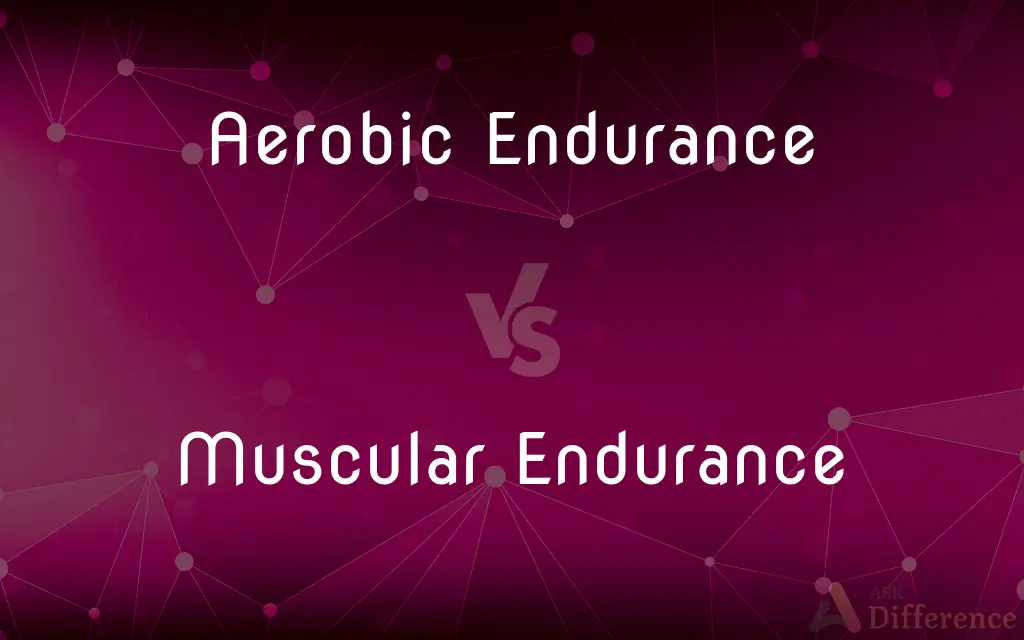Aerobic Endurance vs. Muscular Endurance — What's the Difference?
By Tayyaba Rehman — Published on January 29, 2024
Aerobic Endurance is the ability to perform activities involving large muscles at moderate intensity over time. Muscular Endurance is the ability of a muscle or group to sustain repeated contractions against resistance.

Difference Between Aerobic Endurance and Muscular Endurance
Table of Contents
ADVERTISEMENT
Key Differences
Aerobic Endurance, also known as cardiovascular or cardiorespiratory endurance, refers to the ability of the heart and lungs to supply oxygen to working muscles during sustained physical activity. Muscular Endurance, on the other hand, is the ability of a muscle, or a group of muscles, to sustain repeated contractions against a resistance for an extended period.
Activities that enhance Aerobic Endurance include long-distance running, cycling, and swimming, which involve continuous and rhythmic movements. Muscular Endurance is improved through activities like weightlifting, circuit training, and bodyweight exercises that involve repeated muscle contractions.
The physiological basis of Aerobic Endurance lies in the efficiency of the cardiovascular and respiratory systems to deliver oxygen to muscles. Muscular Endurance, in contrast, depends on a muscle's ability to continue to perform without fatigue, which is influenced by factors such as muscle fiber type and lactic acid accumulation.
Measuring Aerobic Endurance often involves tests like the VO2 max test, which assesses the maximum amount of oxygen a person can utilize during intense exercise. Muscular Endurance is typically measured through exercises like push-ups or sit-ups, counting the maximum number of repetitions a person can perform.
Improving Aerobic Endurance generally leads to benefits like improved heart health, lung capacity, and fat burning, while enhancing Muscular Endurance benefits muscle health, increases metabolic rate, and improves joint stability and bone density.
ADVERTISEMENT
Comparison Chart
Definition
Ability to perform activities at moderate intensity over time
Ability to sustain repeated muscle contractions against resistance
Associated Activities
Running, cycling, swimming
Weightlifting, push-ups, planks
Physiological Basis
Cardiovascular and respiratory efficiency
Muscle's ability to perform without fatigue
Measurement
VO2 max test, endurance running/cycling tests
Repetition-based tests like push-ups or sit-ups
Benefits
Improved heart health, lung capacity
Increased muscle strength, joint stability
Compare with Definitions
Aerobic Endurance
Capacity to perform moderate-intensity exercises over a long period.
Her aerobic endurance allows her to run marathons.
Muscular Endurance
Relies on muscle fiber strength and lactic acid management.
Muscular endurance training helps him manage lactic acid better.
Aerobic Endurance
Involves the efficiency of the cardiovascular system.
Regular cycling has significantly improved his aerobic endurance.
Muscular Endurance
Benefits include increased metabolic rate and joint stability.
Strengthening muscular endurance has improved her overall fitness.
Aerobic Endurance
Leads to improved heart and lung health.
Her consistent jogging routine boosts her aerobic endurance.
Muscular Endurance
Ability of muscles to sustain repeated contractions against resistance.
His muscular endurance enables him to do multiple sets of weightlifting.
Aerobic Endurance
Measured by tests assessing oxygen utilization.
His VO2 max test results showed excellent aerobic endurance.
Muscular Endurance
Improved through resistance training and weightlifting.
Regular push-ups have greatly enhanced her muscular endurance.
Aerobic Endurance
Enhanced by activities like running and swimming.
Training in swimming is key to building her aerobic endurance.
Muscular Endurance
Measured by the number of repetitions of an exercise.
She tested her muscular endurance with a sit-up challenge.
Common Curiosities
What is Muscular Endurance?
The capacity of muscles to sustain repeated contractions against resistance over time.
What is Aerobic Endurance?
The ability to perform prolonged moderate-intensity exercise, involving large muscle groups.
What exercises are best for Muscular Endurance?
Activities like weightlifting, bodyweight exercises, and circuit training.
Can walking improve Aerobic Endurance?
Yes, brisk walking is an effective way to enhance aerobic capacity.
Is yoga good for Muscular Endurance?
Certain yoga poses can help in building muscular endurance.
What are the benefits of Muscular Endurance?
Increased muscle strength, enhanced joint stability, and improved bone density.
How often should I train for Aerobic Endurance?
Ideally, 3-5 times a week, depending on your fitness level.
How long does it take to see improvements in Aerobic Endurance?
It varies, but improvements can be noticed within a few weeks of consistent training.
Do I need equipment to improve Muscular Endurance?
No, bodyweight exercises can effectively enhance muscular endurance.
Does age affect Muscular Endurance?
Yes, muscular endurance can decrease with age, but regular exercise can mitigate this effect.
How can I improve my Aerobic Endurance?
Through regular cardiovascular activities like running, swimming, or cycling.
Why is Aerobic Endurance important?
It improves cardiovascular health, lung capacity, and overall stamina.
Can Muscular Endurance reduce the risk of injuries?
Yes, it can help in reducing the risk of muscle injuries and improve joint health.
Can high-intensity interval training (HIIT) improve Aerobic Endurance?
Yes, HIIT can be an effective method to enhance both aerobic and muscular endurance.
Is Aerobic Endurance the same as stamina?
Stamina often refers to a combination of aerobic endurance and overall energy.
Share Your Discovery

Previous Comparison
Western Digital Blue SSD vs. Western Digital Green SSD
Next Comparison
Begin vs. CbeginAuthor Spotlight
Written by
Tayyaba RehmanTayyaba Rehman is a distinguished writer, currently serving as a primary contributor to askdifference.com. As a researcher in semantics and etymology, Tayyaba's passion for the complexity of languages and their distinctions has found a perfect home on the platform. Tayyaba delves into the intricacies of language, distinguishing between commonly confused words and phrases, thereby providing clarity for readers worldwide.
















































